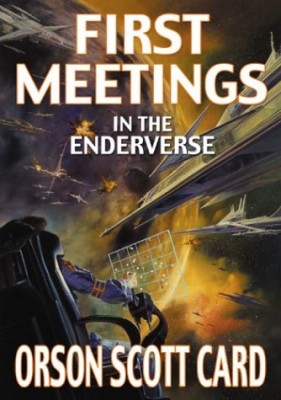 If you fell in love with science fiction when you were twelve, chances were it was because of the awesome space battles. That was certainly the case with me. When I saw Star Wars for the first time, I spent hours running around the house pretending I was flying my own starfighter. In some ways, I’ve never really stopped. 😛
If you fell in love with science fiction when you were twelve, chances were it was because of the awesome space battles. That was certainly the case with me. When I saw Star Wars for the first time, I spent hours running around the house pretending I was flying my own starfighter. In some ways, I’ve never really stopped. 😛
Ever since space opera became its own subgenre, space warfare has featured prominently in it, probably for the same reasons that Homer and Tolstoy framed their sprawling epics with a tale of war. Where else are you going to find enough drama to fill volumes? The fact that it’s set in space makes it so much cooler.
There are a lot of things about the space setting that make war stories different from those set here on Earth. For one thing, there’s a huge element of exploration and unknown. Even before we took the first photographs of Earth from space, there pretty much isn’t any corner on this planet that hasn’t been discovered by somebody. In space, though, it’s still possible to stumble on a hidden planet, or find a mysterious alien artifact that can turn the tide of the war (Halo, anyone?).
For another thing, the dynamics of battle are completely different. Sure, some stories treat space like an ocean, and there’s certainly a place for that kind of story, but the more interesting ones (at least to me) take into account all the profound differences. For one thing, the zero gravity means that there is no “up” or “down,” which means that you have to deal with the possibility of attack coming from any direction, not just along a horizontal plane. That concept alone drives the battles in Orson Scott Card’s Ender’s Game series, where “the enemy’s gate is down.”
One thing that really tickles me is when the story takes things a step further and incorporates things like orbital mechanics and delta-v. I haven’t seen many books or games that do this, but the ones that do have really engrossed me by making the world feel that much more real. Glen Cook did it in Passage At Arms, and the new Battlestar Galactica did it in the viper dogfights (though I’m not sure if they did it on the ship-to-ship scale).
The implications of real-world space physics on warfare are quite fascinating. Rocketpunk Manifesto is an excellent blog that’s almost entirely dedicated to exploring them all, with all sorts of fascinating discussions on what the “plausible mid-future” may look like. But even if all you’re looking for is an entertaining romp through space, the story telling possibilities are so much greater when you take the constraints of physics into account.
For example, if it takes months or even years to travel between planets, and orbital trajectories are fairly straightforward to figure out, how does it affect things if you can see the enemy fleet coming at your planet that long in advance? If escape velocity from a gravity well like Earth is so difficult to achieve, what does that mean about the possibility of long-term planetary sieges? And if starships are so far apart and moving so fast as to make full-on broadsides unlikely, how does that shape the battle tactics and strategy? In spite of the physical constraints (or indeed, perhaps because of them), the possibilities are endless.
Man, I love me some good space battles. One of my recent sci-fi favorites that features some epic battles is Wolfhound by my friend Kindal Debenham. In my own work, you’ll find lots of them, especially in the Gaia Nova series (Bringing Stella Home, Stars of Blood and Glory, and to a lesser extent Desert Stars). They say that the golden age for science fiction is about twelve years old, and that’s definitely true for me. Expect to see lots more space battles from me in the future.

You’ve made some interesting points about space battles. Good topic. The thing that always bugs me is that when a ship explodes and it makes a big noise. I know it’s more effective for cinematic purposes, but in space you couldn’t hear the sound of the explosion. It would probably look much different than usually depicted. This is true in a lot of older movies at least. I don’t know about more recent ones.
Yes! Or a certain Star Wars prequel, where the ship started tilting and everything fell to one side? UGHHH.
Space is cool enough that you don’t have to mimic all the idiosyncrasies of air combat or naval warfare. There are plenty of things unique to space that make for awesome stories, if you know your physics and have enough of an imagination to wrap your mind around the possibilities.